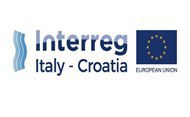AdriaClim
Climate change information, monitoring and management tools for adaptation strategies in Adriatic coastal areas.
AdriaClim is a new research project funded by the Italy-Croatia Interreg Cooperation Programme dedicated to supporting the development of science-based regional and local climate change adaptation plans. AdriaClim is coordinated by the Environmental Protection Agency of Emilia-Romagna Region (ARPAE), involves 19 partners and brings together research institutes, universities, institutions and business from Italy and Croatia.
AdriaClim is a new research project funded by the Italy-Croatia Interreg Cooperation Programme that is dedicated to supporting the development of science-based regional and local climate change adaptation plans. AdriaClim is coordinated by the Environmental Protection Agency of Emilia-Romagna Region (ARPAE), involves 19 partners and brings together research institutes, universities, institutions and business from Italy and Croatia.
Funded by the EU for 9M €, the project is focused on the developing of information tools, integrating observed data and high resolution climate models, as a basis for the development of new strategies and adaptation plans to climate change in marine coastal areas.
ISPRA is especially involved in activities related to the improvement and upgrade of meteo-marine monitoring systems, and is responsible for quality control of the observations, collection and standardization of meteo-marine historical time series and validation of the modelling systems.
It will be further involved in the definition of indicators for the characterization of the effects of climate change on the marine-coastal environment in pilot areas, focusing on physical and hydrodynamic variables and issues of interest for aquaculture.
ISPRA will contribute to the following objectives:
- improvement and implementation of in situ meteo-marine monitoring systems
- validation, harmonization and standardization of historical meteo-marine time series, also in LOD format
- implementation, calibration and validation of a transport and diffusion model of bacterial pollution in shellfish farming areas
- assessment and definition of physical and biological indicators for the characterization of CC impacts in coastal areas
- assessment of vulnerability, hazards and impacts of CC on aquaculture sector in the EMR pilot area
- enhancement of institutional technical skills, sharing information and knowhow with public and private stakeholders
The project has a duration of 36 months, starting in January 2020.

